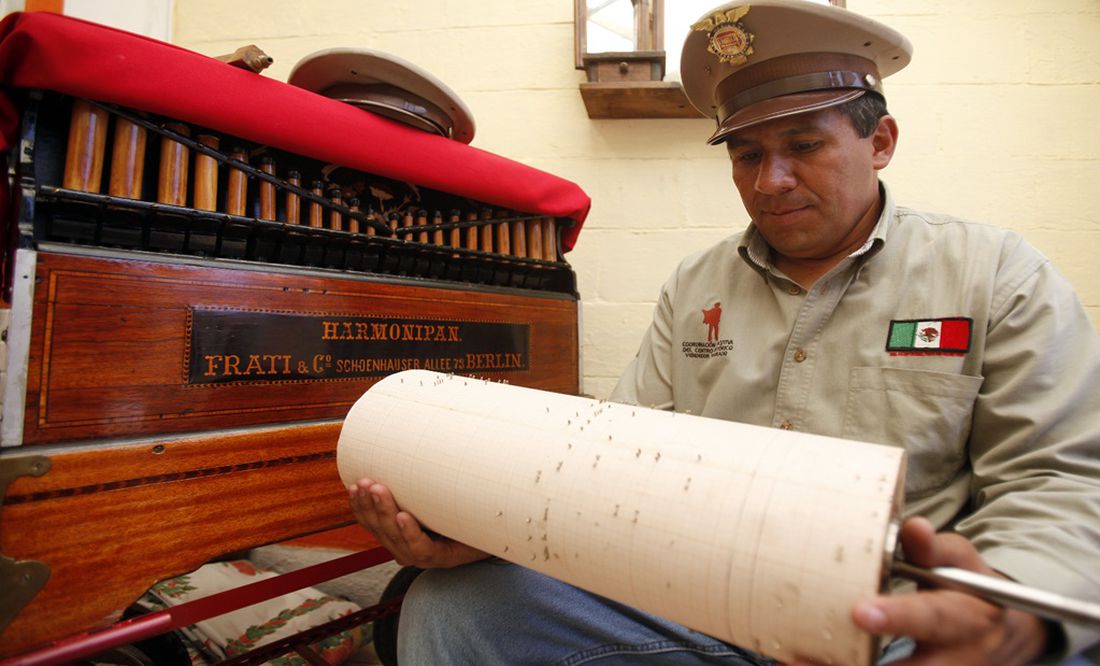Arnulfo Isidro Torres
, who has worked as an organ grinder for 35 years, plays his musical instrument with a classic tune while passersby listen, admire, and take pictures of the trade that was born in Mexico over a century ago.
Isidro Torres’ parents and grandparents worked in this trade and he hopes his sons do so too since “more young people are getting interested. We have had apprentices and then they go out to the streets because they see it as a way of life .”
Organ grinders became popular in Germany for that country had the best musical organ producers; the instrument arrived in Mexico in 1880 and they began to be present in gardens with songs like “Las Mañanitas” or “Cielito Lindo.”
Have you heard of
?
Black boots, brown cap with a black line, and beige trousers are the uniform of the 500 organ grinders in the country , out of which 450 are in Mexico City.
They wear it like that in honor of Pancho Villa and they are called “ Los Dorados .” Some of them even have Mexico’s flag embroidered to their uniforms.
Moneda street
, next to the National Palace, has become, since 7:00 from Monday to Friday, a “touristic” place due to the news conferences of President Andrés Manuel López Obrador . Arnulfo is behind the organ sound that can be heard sometimes.
Have you heard of the man
?
“In over a decade we have been recognized, but not by a president , even [in the morning news conference] I come with fear of interrupting an important announce with a song; however, we need a lot of support, because we don’t receive a wage and we live from tips people give us,” he said.
Organ grinders earn from MXN $100 to $500 per day but it “depends” on the number of people, the weather, and even the protests; 50% of them rents the musical instrument for MXN $70 to $100 per day plus the cost of the place to keep it. Each organ weighs some 30 kg and is bought from a company in Germany or Mexico for MXN $80,000 to $120,000 .
Luis Román Dichi Lara
, leader of Mexico’s Organ Grinders Union , said that they are looking for Mayoress Claudia Sheinbaum and the Local Congress to give them labor rights with social security, housing support, credits, and scholarships for their children for although they have been recognized as the city’s cultural heritage they lack any support.
Have you heard of the project
?
He mentioned that the city’s government used to give them three uniforms per year but now they only receive an ID with which they are allowed to work on the public road.
“We are part of a vulnerable and poor group , that is why we’re asking for this kind of support. We’re working with authorities from the [local] Congress, but actually, the work we had done with the previous administration was left behind and now we have to begin again; something similar happens in every administration and we have not been supported by Mexico City’s authorities ,” he asserted.
In that sense, Dichi Lara explained that the 500 organ grinders, according to the national registry, are a part of history for they are a traditional figure in downtown Mexico City and have been present in important events like the times of the Mexican Revolution .
He added that currently, the organs play songs like “ Adelita ,” “ Cielito Lindo ,” “Cuatro Milpas,” “ El Charrasqueado ,” “ Gema ,” and “ Volver, Volver, ” as well as more recent songs but the process is expensive and hard since the music sheets – the rolls – must be made by an expert in the mechanism of the organ.
mp





/cloudfront-us-east-1.images.arcpublishing.com/eluniversal/CHBDJQYDOBDILMUSUJMLSIHCRU.jpg)
/cloudfront-us-east-1.images.arcpublishing.com/eluniversal/RGPDMMHDNNCMJMAOOFWNDLN3XQ.jpg)
